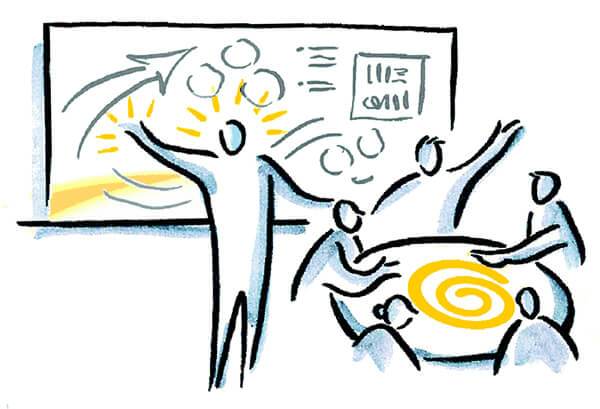
1.发展工作伙伴关系(Developworking partnerships)
澄清相互的承诺 (Clarifymutual commitment )
建立对任务,交付成果,角色及职责的共识 (Develop consensus on tasks, deliverables, roles &responsibilities )
展现合作的价值与流程,如共同引导(Demonstrate collaborative values and processes such as into-facilitation )
2.设计与定制应用以满足客户的需求(Designand customize applications to meet client needs)
分析组织环境(Analyzeorganizational environment )
诊断客户需要(Diagnoseclient need )
建立适当的设计以达到预期的结果(Createappropriate designs to achieve intended outcomes)
与客户预先定义产品和结果的质量(Predefinea quality product & outcomes with client)
3.有效管理多次活动( Managemulti-session events effectively)
与客户约定工作范围和可达成的成果 (Contract with client for scope and deliverables )
制定活动计划 (Developevent plan )
成功完成活动 (Deliverevent successfully )
在项目的每个阶段都评估客户满意度(Assess / evaluate client satisfaction at all stages of the event orproject)
1.选择明确的方法和流程……(Selectclear methods and processes that)
² 促进开放的参与,并尊重客户的文化,规范和参与者的多样性(Foster open participation with respect for client culture, norms and participant diversity )
² 让各种学习和思考风格的参与者都投入参与 (Engage the participation of those with varied learning/thinking styles )
² 达成符合案主需要的高质量的成果 (Achieve a high quality product/outcome that meets the client needs )
2.准备能够支持团队流程的时间和场地(2.Prepare time and space to support group process)
² 安排能够达成聚会目的的实体空间 (Arrange physical space to support the purpose of the meeting )
² 规划有效的时间运用 (Plan effective use of time )
² 为活动提供有效的氛围与剧情 (Provide effective atmosphere and drama for sessions )
1.展现有效参与及人际沟通的技巧( Demonstrate effective participatory and interpersonal communication skills)
应用多元参与流程 (Applya variety of participatory processes )
展现有效的言语沟通技巧(Demonstrateeffective verbal communication skills )
与参与者发展密切的连接关系(Developrapport with participants )
实践积极的聆听(Practicesactive listening )
展示观察的能力并提供回馈给参与者 (Demonstrate ability to observe and provide feedback to participants )
2.识别并尊重多元性以确保兼容并蓄(Honor and recognize diversity, ensuring inclusiveness)
² 鼓励正面看待所有参与者的想法和经验 (Encourage positive regard for the experience and perception of all participants )
² 创建安全和信任的气氛 (Create a climate of safety and trust )
² 为参与者创造机会从团队的多元中获益 (Createopportunities for participants to benefit from the diversity of the group )
² 培养对文化的察觉力和敏感度 (Cultivate cultural awareness and sensitivity )
3.处理团队的冲突( Managegroup conflict)
帮助个人识别和审视内心的假设 (Helpindividuals identify and review underlying assumptions )
识别团队冲突在团队学习/发展中的角色(Recognize conflict and its role within group learning /maturity )
提供一个安全的环境让冲突可以浮现 (Provide a safe environment for conflict to surface )
处理具有破坏性的团队行为(Managedisruptive group behavior )
支持团队度过冲突排解的过程(Supportthe group through the resolution of conflict )
4.引发团队创造力( Evokegroup creativity)
引出各种学习和思考风格参与者的想法 (Draw out participants of all learning and thinking styles )
鼓励创意思考(Encouragecreative thinking )
接受所有的见解 (Acceptall ideas )
采用最合适团队需求及能力的方法 (Use approaches that best-fit needs and abilities of the group )
激发并应用团队的能量 (Stimulateand tap group energy )
1.以明确的方法及流程引领团队( Guide the group with clear methods and processes)
² 对当次活动建立清楚的脉络关系(Establishclear context for the session )
² 积极地聆听、发问并总结以萃取团队的意念(Actively listen, question and summarize to elicit the sense of the group )
² 识别出偏离并指回到任务上(Recognizetangents and redirect to the task )
² 管理大、小团队的流程 (Managesmall and large group process )
2.引领团队对自身任务的自觉(Facilitategroup self-awareness about its task)
² 依照团队的需要调整活动的步调 (Varythe pace of activities according to needs of group )
² 识别团队需要的信息并引出团队中的数据和其洞察力(Identify information the group needs, and draw out data and insight from the group )
² 协助团队综合出模式、趋势、根源成因及行动架构(Help the group synthesize patterns, trends, root causes, frameworks for action )
² 协助团队省思经验(Assistthe group in reflection on its experience )
3.带领团队达成共识与希望的成果(Guidethe group to consensus and desired outcomes)
² 运用各种方达成团队共识(Usea variety of approaches to achieve group consensus )
² 运用各种方法达成团队目标(Usea variety of approaches to meet group objectives )
² 针对情形变化与团队需要改变程序(Adaptprocesses to changing situations and needs of the group )
² 评估和沟通团队进展 (Assessand communicate group progress )
² 促成任务的达成 (Foster task-completion )
1.保持基础知识( Maintain a base of knowledge)
管 理、组织系统、团队发展、心理学及冲突解决 (Knowledgeable in management, organizational systems and development,group development, psychology, and conflict resolution )
了解变革的动态 (Understanddynamics of change )
了解学习和思考的原理(Understandlearning and thinking theory )
2.了解多种引导方法( Know a range of facilitation methods)
了解问题解决与决策模型 (Understandproblem solving and decision-making models )
了解各种团队的方法与技巧 (Understanda variety of group methods and techniques )
知道误用团队方法的后果 (Knowconsequences of misuse of group methods )
能将流程区分于任务及内容之外(Distinguishprocess from task and content )
学习新的程序、方法、模式以应对客户需求的改变和出现(Learn new processes, methods, & models in support of client’s changing/emerging needs )
3.保持专业水准(Maintain professional standing)
参加引导专业的最新研究与学习活动(Engage in ongoing study/learning related to our field )
持续补充引导专业的新信息(Continuouslygain awareness of new information in our profession )
实践反思与学习(Practicereflection and learning )
建立个人的产业知识与人际网络(Buildpersonal industry knowledge and networks )
保持认证持续有效 (Maintaincertification )
1.练习自我评估和自我察觉(Practice self-assessment and self-awareness )
² 对于行为和结果的反思(Reflecton behavior and results )
² 保持行动与个人及专业价值的一致性(Maintain congruence between actions and personal and professional values )
² 调整个人行为或风格以反应团队的需要(Modify personal behavior/style to reflect the needs of the group )
² 了解个人价值观及其对于客户工作的影响(Cultivate understanding of one‘’s own values and their potential impact on work with clients )
2.言行一致( Act withintegrity)
展现对于团队及其潜能的信念(Demonstratea belief in the group and its possibilities )
以真诚及正面的态度面对情形(Approachsituations with authenticity and a positive attitude )
以引导者的眼光描述情形并探寻不同的观点(Describe situations as facilitator see them and inquire into different views )
展现专业的界线与道德(参考IAF之道德与价值宣言)(Model professional boundaries and ethics (as described in ethics and values statement) )
3.信任团队潜力并保持中立态度(Trust group potential and model neutrality)
尊重团队的智慧(Honorthe wisdom of the group )
鼓励信任别人的能力与经验(Encouragetrust in the capacity and experience of others )
警觉地减少对团队成果的影响(Vigilantto minimize the influence on group outcomes )
维持客观、无防卫、不批判的姿态(Maintainan objective, non-defensive, non-judgmental stance)